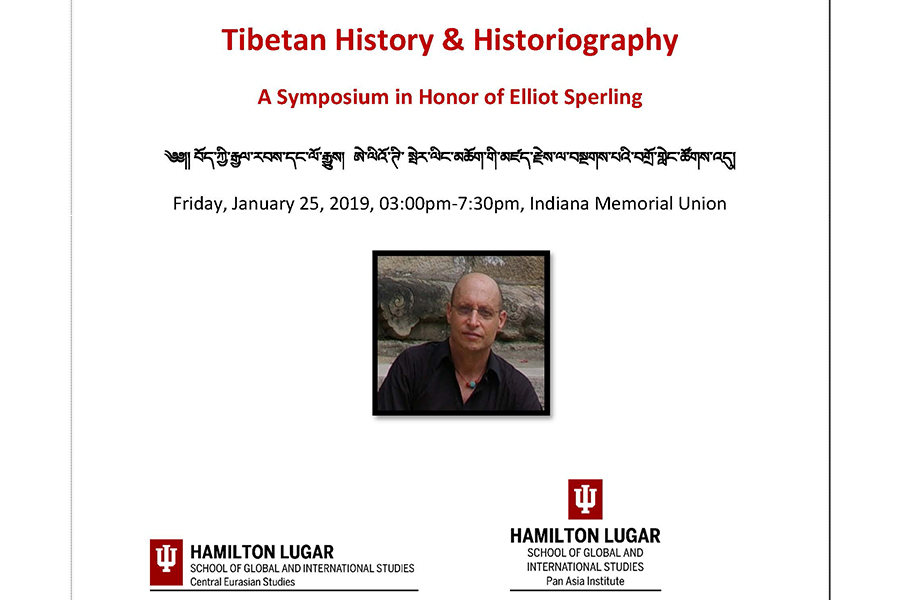Elliot Sperling, who retired an Associate Professor from the Department of Central Eurasian Studies in December 2015, passed away more than two years ago, but his legacy continues to inspire the field of Tibetan Studies at Indiana University and around the world. Several of Sperling’s teachers, students, and colleagues held a symposium on Tibetan history and historiography in his honor with support from the Inner Asian and Uralic National Resource Center. Attendees at the symposium learned that Sperling’s influence at IU will continue through a generous donation of books and a new scholarship that will bear his name.
Ron Sela, Associate Professor in the Department of Central Eurasian Studies and one of Sperling’s longtime friends, undertook the substantial task of organizing the symposium, which was attended by dozens of individuals from IU and the local community. His Excellency 11th Shingza Rinpoche Tenzin Choesky Gyaltsen offered a dedication to open the symposium, but the solemn opening note soon became more celebratory as presenters discussed the significance of Dr. Sperling’s substantial body of scholarship and contributions to Tibetan Studies, including his role as mentor for his students.
Several of Sperling’s former students presented at the symposium and recalled their experiences studying with him. Eveline Washul, postdoctoral fellow at Columbia University’s Weatherhead East Asian Institute, discussed the interplay of Tibetan and Chinese sources in Elliott Sperling’s work on the political and social aspects of religion and note the power of the work to stimulate future research. Sara Conrad, a doctoral candidate in the Departments of Central Eurasian Studies and Anthropology, emphasized a similar theme while noting Sperling’s dedication to understanding history on its own terms, especially when the narratives contained within sources ran counter to prevailing contemporary interpretations of the past. Tenzin Tsepak, doctoral candidate in the Department of Central Eurasian studies, similarly observed that Sperling’s commitment to philology and taking a long view of the past has encouraged other scholars to appreciate new aspects of Tibetan history.
Sperling’s teachers and colleagues offered similarly fond reminisces as they described his influence. Lynn Struve, Professor Emerita of the Department of History, recalled the challenges of guiding a student through research in an unfamiliar field. Christopher I. Beckwith, Distinguished Professor in the Department of Central Eurasian Studies, offered a tribute to his student in the form of a discussion of the etymology of the Jokhang Temple’s original name. Also noting Sperling’s sensitivity to language, Gedun Rabsal, Senior Lecturer in Tibetan in the Department of Central Eurasian Studies, shared exemplary texts that showcased Sperling’s signature translation style. György Kara, Professor in the Department of Central Eurasian Studies, also remembered Sperling’s kindness toward his colleagues and his ability to spur research in other fields of study by sharing texts and other resources.
Sperling’s own extensive library collection and commitment to supporting research will ensure that his legacy includes supporting scholarly activities in the future. Kristina Dy-Liacco, managing director of the Latse Library, introduced Sperling’s material legacy as manifested in the thousands of volumes of his collection that will enrich the English, Chinese, and Tibetan language holdings in Tibetan Studies at IU’s Herman B Wells Library. Several of these volumes are unique in North America, so their availability through a major public university’s research collection will provide a boost to research about Tibet in North America. In addition, a new scholarship named after Sperling will support students at IU who are engaged in the field of Tibetan Studies.
These new components of Tibetan Studies at IU are evidence that the Department of Central Eurasian Studies remains committed to scholarship and teaching in this field. Stacey Van Vleet, Assistant Professor in the Department of Central Eurasian Studies and postdoctoral fellow at Harvard University, noted that she also derives inspiration from Sperling’s work. Van Vleet explained that Sperling’s scholarly approach drew equally upon his principles as an intellectual and his meticulous attention to the nuances of historical questions and sources.
Sperling was an accomplished scholar, mentor, and human rights advocate, who spent nearly four decades at IU. Although he was a leading historian of Tibet and Tibet-China relations and a MacArthur Fellow, his influence goes far beyond his research to include substantial public engagement. He was a critic of the People’s Republic of China’s policies in Tibet and equally critical of the Dalai Lama, Tibet’s government-in-exile, and Tibetophiles. More recently, Sperling was an impassioned voice speaking out on behalf of Ilham Tohti, a Uyghur professor of economics at Minzu University in Beijing who was imprisoned on charges of separatism in 2014. Sperling’s seamless blending of rigorous scholarship and outspoken public advocacy will continue to inspire scholars in Tibetan Studies and beyond in the future.
Related Links:
Download a copy of the program from the symposium.
See a gallery of photos from the symposium.
Listen to recordings of presentations from the symposium.
View the memorial resolution read in Elliot Sperling’s honor at the IU Bloomington Faculty Council.
Support the Elliot Sperling Tibetan Language Scholarship.


